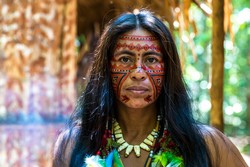The study of Aboriginal knowledge
The world has around 5 000 indigenous groups, many of which are often the subject of various aid and development programmes. However, such programmes rarely take into account the perspectives of the indigenous people themselves, and the differences can be very important. The EU-funded IEIPWA (Indigenous epistemologies and images of public wealth in Amazonia) project examined indigenous epistemological perspectives, meaning theory of knowledge and modes of knowing. The multi-ethnic study region of Amazonia, called Gent de Centro, spans Columbia and Peru, and includes about 7 500 indigenous individuals. The team transcribed, systematised and analysed field data collected between 1996 and 2010. Work began with analysis of indigenous interpretations of development. Results introduced indigenous notions of wealth, value and well-being, and how such viewpoints affect intercultural relations. Indigenous people of the study region considered western money to be pathogenic. The finding means a clash between western and indigenous views of well-being. Further investigations revealed that indigenous epistemologies involve sophisticated theories of cognition, as well as social and personal agency. Such viewpoints inform indigenous senses of history and culture. Key differences from western thinking include the concept of work. In indigenous terms, the concept means the ongoing creation of real people according to ancestral law. The concept affects correct management of natural resources and relations with the spiritual owners of such resources. In such terms, the goal of daily work is to maximise collective health and abundance. Notions of well-being are also the foundation for indigenous interaction with other cultures. Indigenous people view western concepts of individual wealth accumulation as socially, personally and environmentally harmful. Instead, the studied peoples acknowledge public wealth as the only true form of wealth. For indigenous people, knowledge is a spiritual quantity, intended to create well-being, yet it is not constructed. Instead, knowledge is achieved through personal quests of self-discovery. People of the region do not think in terms of mind-body dualism. IEIPWA results provide sustainable alternatives to current development paradigms, and help development organisations orient their programmes to the views of the affected people. The project outcomes help to foster productive intercultural exchange.




